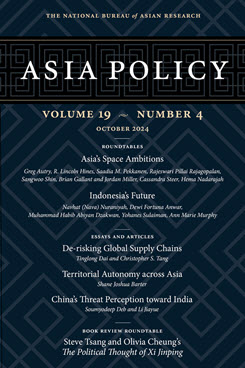Article in Asia Policy 19.4
Territorial Autonomy across Asia
Assessing Challenges, Addressing Concerns
This article analyzes one response to the challenges that governments face in managing diverse ethnic minorities—special self-government through territorial autonomy—focusing on Asian cases such as Aceh, Mindanao, Kashmir, Tibet, and Xinjiang, among others.
Executive Summary
MAIN ARGUMENT
This article addresses five concerns related to territorial autonomy as a method of governing diverse ethnonational populations: (1) autonomy provides a path to eventual independence, (2) granting autonomy to one region triggers a cascade of demands from others, (3) autonomy results in ineffective governance, (4) self-government amplifies differences between groups rather than bridges them, and (5) autonomous regions mistreat local minorities. It argues that the first two concerns are exaggerated, while the third is more mixed; meaningful autonomy has yet to result in independence and does not typically spark demands from other regions but might lead to poor governance. The final two concerns are more valid, rooted in the very purpose of self-government; autonomy leads to regional nation-building that could weaken relations with other groups and generate tensions with local minorities.
POLICY IMPLICATIONS
- Territorial autonomy serves distinctive minorities, but it also serves national governments. Autonomy should be seen as a conservative institution that preserves the territorial status quo.
- The most important concerns related to territorial autonomy are within autonomous regions. This shifts the focus from maintaining a country’s integrity and toward designing better forms of autonomy. Within autonomous regions, laws should speak to minority rights, encouraging titular minorities to recognize their own minority groups.
- Territorial autonomy has underappreciated potential to manage minority demands while maintaining international borders in Asia-Pacific countries.
Shane Joshua Barter is Professor of Comparative Politics at Soka University of America (United States). He has authored several books and articles related to civil wars, separatism, and minority self-government in Asia and is completing a book manuscript on the various types and goals of territorial autonomy.
About Asia Policy
Asia Policy is a peer-reviewed scholarly journal presenting policy-relevant academic research on the Asia-Pacific that draws clear and concise conclusions useful to today’s policymakers. Asia Policy is published quarterly in January, April, July, and October and accepts submissions on a rolling basis. Learn more


